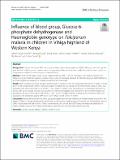Influence of blood group, Glucose-6-phosphate dehydrogenase and Haemoglobin genotype on Falciparum malaria in children in Vihiga highland of Western Kenya

View/
Publication Date
2020-07-09Author
Jafaralli Sande Ahmed, Bernard Guyah, Mark Kilongosi Webale, Nathan Shaviya Mufyongo, Elly Munde, Collins Ouma
Metadata
Show full item recordAbstract/
Genetic diversity of ABO blood, glucose-6-phosphate dehydrogenase (G6PD) deficiency and haemoglobin type and their ability to protect against malaria vary geographically, ethnically and racially. No study has been carried out in populations resident in malaria regions in western Kenya. A total of 574 malaria cases (severe malaria anaemia, SMA = 137 and non-SMA = 437) seeking treatment at Vihiga County and Referral Hospital in western Kenya, were enrolled and screened for ABO blood group, G6PD deficiency and haemoglobin genotyped in a hospital-based cross-sectional study. When compared to blood group O, blood groups A, AB and B were not associated with SMA (P = 0.380, P = 0.183 and P = 0.464, respectively). Further regression analysis revealed that the carriage of the intermediate status of G6PD was associated with risk to SMA (OR = 1.52, 95%CI = 1.029–2.266, P = 0.035). There was, however, no association between AS and SS with severe malaria anaemia. Co-occurrence of both haemoglobin type and G6PD i.e. the AA/intermediate was associated with risk to SMA (OR = 1.536, 95%CI = 1.007–2.343, P = 0.046) while the carriage of the AS/normal G6PD was associated with protection against SMA (OR = 0.337, 95%CI = 0.156–0.915, P = 0.031). Results demonstrate that blood group genotypes do not have influence on malaria disease outcome in this region. Children in Vihiga with blood group O have some protection against malaria. However, the intermediate status of G6PD is associated with risk of SMA. Further, co-inheritance of sickle cell and G6PD status are important predictors of …
